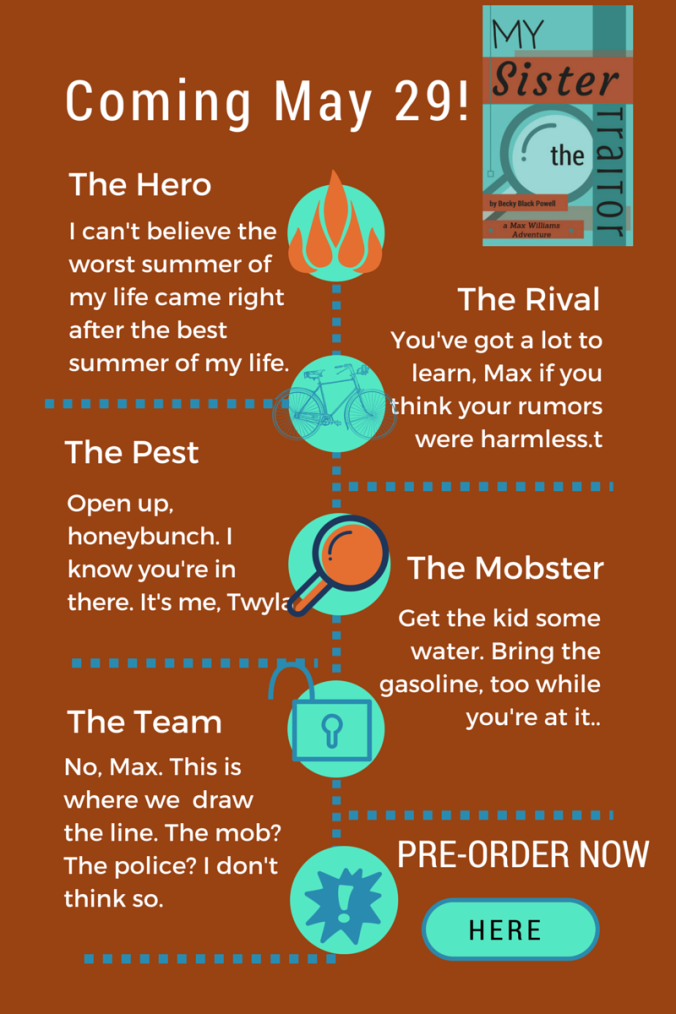
My new book, My Sister, the Traitor includes this old Zen folktale about a big, pesky rat and the cats who try to catch it. One of the characters in the book tells this tale to show his aikido students the connection between Zen principles and the practice of martial arts. I’ve adapted this folktale from the original version written in 1727 by Issai Chozan.
The Cats and the Big Rat
Once there was a swordsman named Shoken who had a pesky problem. A rat had taken up residence in his house. But, this wasn’t your ordinary rat. This rat was so daring, so bold and fearless, it didn’t even try to hide its mischief.
Shoken trapped the rat in a room and sent in his pet cat to catch it. But, the faithful old pet was hardly the equal of the bold rat. The rat bit the cat in the face and she ran away crying pitifully.
Now, Shoken knew of some cats in the neighborhood that were known for their great skill and courage in rat-catching. So, he sent his servant to bring these cats to his house. He showed the great cats into the room where the rat sat, relaxing happily in a corner.
The rat watched the cats approach from his and looked rather unconcerned. Then, the rat viciously attacked each of the cats, who beat a hasty and terrified retreat.
Well, Shoken got so angry and frustrated at this point. His concerned servant told him about a cat he had heard of that lived nearby. He told Shoken that, despite this cat’s plain and unassuming appearance, she had a reputation for being the best rat-catcher in all the area.
Now it was certainly true that this cat was not better looking than the other cats – the ones who lost to the rat. Shoken was not impressed by her looks at all. But he was desperate, so he pointed her toward the room with the rat.
This cat went into the room with the waiting rat as if absolutely nothing were out of the ordinary, moving quietly and slowly, with no particular attitude.
The difference was in the rat. He was visibly terrified by the plain, homely cat. It huddled in a corner, frozen with fear. The cat walked calmly to the rat, picked it up in his jaw, and carried it out by the neck.
Now that evening, the other cats, eager to learn the secrets of this master rat-catcher asked her to meet with them. They gave her a seat of honor and bowed deeply before her and said, “We are famous for our bravery, skill, and cleverness, but we’ve never faced a rat like this. None of us had the slightest bit of success, yet you easily got rid of the rat. We beg you tell us your secrets.”
The plain cats said, “First, each of you tell me how you have trained.”
The first, a sleek black cat, came forward. “I was born to be a rat-catcher. My father and his father before him were rat-catchers. From the day I was born I did nothing but train to become the great rat-catcher I was destined to become. I can leap over obstacles seven feet tall. I can squeeze myself into the tiniest rat hole. My acrobatic skills are second to none. I am particularly known for my ability to fool a rat into thinking I am asleep, then as soon as they are within reach, striking with flashing speed. It is most embarrassing that I was forced to retreat from that old rat today.
“Ah,” said the plain cat. “You are indeed most skilled in the technique of the art. You focus on planning out how to combat your foe. But technique is only one part of what it takes to master of the art. You are clever, yes, and that cleverness comes from your active mind, and that is important to the art. But, focusing on cleverness alone will not help you become a master.
![By Hishida shunso (1874 - 1911) (Japanese) (Painter, Details of artist on Google Art Project) [Public domain or Public domain], via Wikimedia Commons](https://myneighborthespy.files.wordpress.com/2015/02/hishida_shunso_-_cat_and_plum_blossoms_-_google_art_project.jpg?w=676)
By Hishida shunso (1874 – 1911) (Japanese) (Painter, Details of artist on Google Art Project) [Public domain or Public domain], via Wikimedia Commons
A beautiful tiger-striped cat came forward and said, “I believe the most important part of fighting is the spirit, or the ch’i. I have spent many years developing my ch’i, to the point that my spirit fills heaven and earth it is so strong. It is my great spirit that overwhelms my opponent. Because of my highly developed spirit, I do not have to plan out my fighting technique; it simply flows out naturally, depending on the situation. My intent gaze alone should have defeated that rat. But, it did not.
“Ah,” said the plain cat. “You obviously have great psychic powers. But, you are too aware of your spirit, which weakens you. You never know if your opponent’s spirit is stronger than yours. You say your spirit is so great it fills heaven and earth, but it does not. What you are describing is just an image of your spirit, not the spirit itself. Your spirit only comes into being under certain conditions but true spirit is bright and illuminating. It is the difference between a great flowing river that is always there and a flood after a great rainfall.
A furry grey cat came forward and said, “I have trained faithfully to not over-awe my opponent. I have developed the discipline to not force a fight. Against a strong enemy, I adopt a yielding and conciliatory attitude, simply following up his movements. In this way, I am like a curtain yielding gently to a stone thrown at it. Even a strong rat should find no way to fight me. But this rat today did not submit to my yielding psyche.
“Ah,” said the plain cat. “Your yielding psyche is only something you created with your conscious mind. Your yielding psyche is artificially created and thus it interferes with your natural perception and agility. The only way to truly let nature take its course is to do away with all that artificial thinking and planning.
The three defeated cats looked glumly at the plain cat. He said to them, “You have each trained hard and developed your useful skills. Skill in technique is the vessel for reason. The body is the vessel for spiritual power. And, when the body is in harmony with nature, it acts in accord with the environment, thus the yielding psyche is able to stop fighting on the physical plane of force. You must not let ego or self-consciousness interfere with your practice. Only then will you become masters of the art.
Featured Image Photo Credit: http://”Cats suggested as the fifty-three stations of the Tokaido”. Licensed under Public Domain via Wikimedia Commons – http://commons.wikimedia.org/wiki/File:Cats_suggested_as_the_fifty-three_stations_of_the_Tokaido.jpg#mediaviewer/File:Cats_suggested_as_the_fifty-three_stations_of_the_Tokaido.jpg









![By Hishida shunso (1874 - 1911) (Japanese) (Painter, Details of artist on Google Art Project) [Public domain or Public domain], via Wikimedia Commons](https://myneighborthespy.files.wordpress.com/2015/02/hishida_shunso_-_cat_and_plum_blossoms_-_google_art_project.jpg?w=676)

